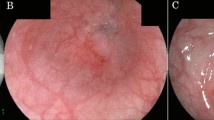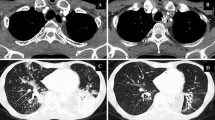Abstract
Purpose
Closure of GG fistulas after RYGB is challenging due to epithelialization of the tract. Common endoscopic therapies are less efficacious than surgical revision, which is unfortunately fraught with high morbidity and mortality. Cardiac septal defect occluders (CSDO) have been successfully used for the management of gastrointestinal fistulas, but use has never been reported in management of GG fistulas. Thus, we describe the first off-label use of CSDO for the treatment of a GG fistula.
Materials and Methods
Endoscopy and fluoroscopic examination determined the appropriate size of CSDO for closure. A guidewire was placed in the remnant stomach followed by placement of the delivery system. Then, under fluoroscopy, we deployed the first flange of the CSDO in the remnant stomach. Then, under fluoroscopy and endoscopic visualization, the second flange is deployed in the gastric pouch.
Results
A 51-year-old woman, status-post RYGB in 2008, presented with a 6-month history of weight regain and reflux. She had regained weight to 84 kg (BMI = 32 kg/m2) when she was found to have a GG fistula. She underwent successful CSDO placement and, 3 months later, had lost 10 kg with significant improvement in her reflux. Repeat evaluation confirmed successful fistula closure.
Conclusion
The use of CSDO was technically feasible and appeared to be effective and safe. Future studies should continue to investigate the role of CSDO in management of this challenging condition.
Similar content being viewed by others
References
de Moura DTH, Sachdev AH, Thompson CC. Endoscopic full-thickness defects and closure techniques. Curr Treat Options Gastroenterol. 2018;16(4):386–405.
Baptista A, Hourneaux De Moura DT, Jirapinyo P, et al. Efficacy of the cardiac septal occluder in the treatment of post-bariatric surgery leaks and fistulas. Gastrointest Endosc. 2019;89(4):671–9.
Author information
Authors and Affiliations
Corresponding author
Ethics declarations
Conflict of Interest
Christopher C. Thompson reports fee as a consultant for Boston Scientific, USGI Medical, Olympus, Fractyl Labs, and Apollo Endosurgery.
Eduardo Guimarães Hourneaux de Moura is a consultant for Boston Scientific and Olympus.
All other authors declare that they have no conflict of interest.
Ethical Approval
Institutional Review Board of the Hospital approved the study. An informed consent was signed by the patient before the procedure.
Additional information
Publisher’s Note
Springer Nature remains neutral with regard to jurisdictional claims in published maps and institutional affiliations.
Electronic supplementary material
(MP4 81446 kb).
Rights and permissions
About this article
Cite this article
de Moura, D.T.H., da Ponte-Neto, A.M., Hathorn, K.E. et al. Novel Endoscopic Management of a Chronic Gastro-Gastric Fistula Using a Cardiac Septal Defect Occluder. OBES SURG 30, 3253–3254 (2020). https://doi.org/10.1007/s11695-020-04616-y
Published:
Issue Date:
DOI: https://doi.org/10.1007/s11695-020-04616-y




